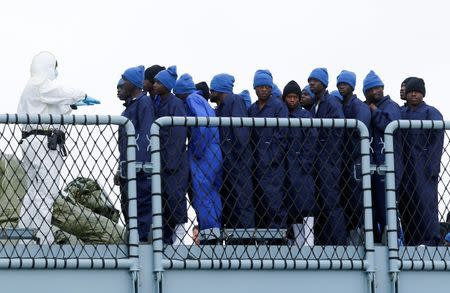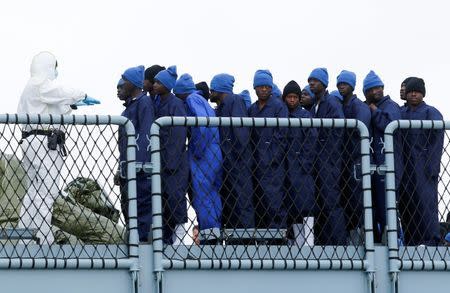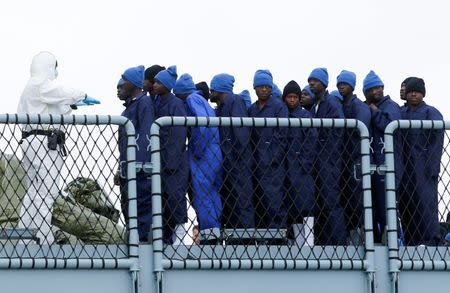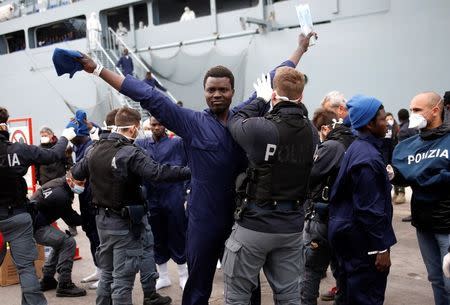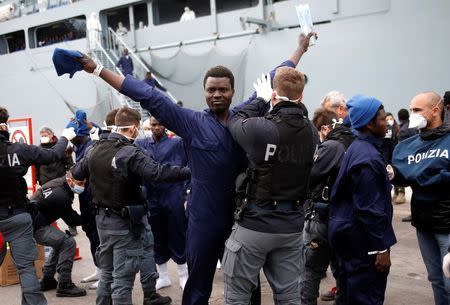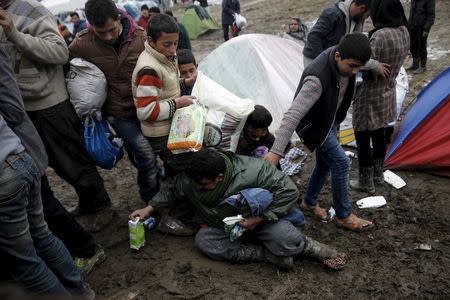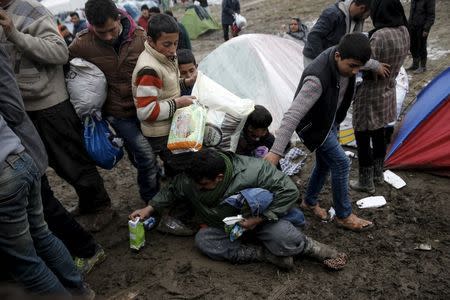EU's Turkey migration deal hinges on Cyprus - Tusk
By Gabriela Baczynska
BRUSSELS (Reuters) - The European Union warned on Wednesday that a deal with Turkey to curb mass migration to Europe hinges on Ankara acting to support peace talks in EU member Cyprus.
European Council President Donald Tusk, who will chair an EU summit on Thursday and Friday, said much remained to be done to reach a deal with Turkey.
"Work is progressing but there is still a lot to do," he said in a letter to EU leaders. The migration deal needed to be "an opportunity (for Turkey) to support the settlement talks in Cyprus. Only if this is possible can we move forward here."
EU officials offered last-minute tweaks to the draft pact with Turkey in an effort to make it legally watertight, but a standoff with Cyprus could yet scupper any deal this week.
Under a tentative agreement reached last week, Ankara would take back all migrants and refugees who enter the EU from its shores or are detained in its territorial waters, in return for more money, faster visa-free travel for Turks and a speeding up of its slow-moving EU membership negotiations.
For its part, the EU would admit one legal Syrian refugee directly from Turkey for each one trying to reach Europe by boat and taken back by Turkey from the Greek islands in a step meant to wreck the business model of people smugglers.
But Cypriot President Nicos Anastasiades has threatened to veto any progress in Turkey's accession talks unless Ankara meets its obligation to open Turkish ports and airports to Cypriot traffic, effectively recognising his state.
A new draft agreement circulated by Tusk to EU states on Wednesday and seen by Reuters gave little concrete away to Turkish Prime Minister Ahmet Davutoglu, who is due to finalise the deal with EU leaders at a breakfast in Brussels on Friday.
It states: "The EU, together with Turkey, will prepare for the decision on the opening of new chapters in the accession negotiations as soon as possible." That final phrase "as soon as possible" did not appear in the shorter draft Davutoglu endorsed last week. Nor did the phrase "together with Turkey".
Cyprus has been insisting that any wording must reflect the fact that Turkey has not yet met EU conditions for opening such new chapters. There was no immediate comment on the draft from Ankara or Nicosia.
National envoys who discussed the draft in Brussels late on Wednesday said there was a broad willingness to accept it but some issues would be addressed by leaders on Thursday, in particular the matter of when deportations will start. Germany pushed for next Monday but Greece said its services might not be ready, one diplomat said.
There may also be discussion at the summit, before Davutoglu arrives, of how fast to provide a second 3 billion euro instalment of EU aid for Syrians in Turkey and of which states are willing to take in resettled Syrian refugees from Turkey.
"NO FREE RIDE"
"We are certainly not giving Turkey a free ride," European Commission Vice President Frans Timmermans said. Ankara would have to enact a raft of measures within six weeks if Turks were to get visa-free travel to the 26-nation Schengen area in June.
German Chancellor Angela Merkel is pushing hardest for the deal after suffering heavy losses in regional elections on Sunday due to public anger over an uncontrolled influx of more than 1 million migrants into Germany last year.
Merkel told parliament in Berlin on the eve of the Brussels summit that no one should be "deceived" by a relative lull in arrivals since Austria and Balkan countries shut their borders.
More than 43,000 migrants and refugees are bottled up in squalid conditions in Greece after Macedonia closed its border, and more are arriving daily despite NATO's Aegean sea patrols.
"The current easing that Germany and some other member states are experiencing is one thing. The situation in Greece is the other, and it must be a big concern to us all because it is not without consequences for us all in Europe," Merkel said.
An agreement with Turkey would need to be followed by a deal among EU countries to accept quotas of refugees, she said, something several central European states have so far rejected.
"TEMPORARY AND EXTRAORDINARY"
"This will be a temporary and extraordinary measure which is necessary to end the human suffering and restore public order," Tusk's draft accord said.
Migrants arriving on Greek islands would be duly registered and entitled to apply for asylum in Greece, it said, and their applications would be processed in accordance with EU rules.
People returned to Turkey would be protected in line with international standards for refugees, even though Ankara applies the Geneva Convention formally only to people fleeing Europe.
Cyprus and Turkey have been at loggerheads since a 1974 Turkish invasion of the island.
Nicosia could also try to block visa liberalisation for Turks since the EU conditions include the principle of equal treatment of all member states. It does not have a veto on the visa issue, but it could find allies among reluctant countries such as France, Spain and Austria.
Acting Spanish Prime Minister Mariano Rajoy said on Wednesday in an interview with Telecinco he was “absolutely convinced” EU leaders would reach a common position on migration. But he said the deportation of refugees from Greece to Turkey was against international law and any deal must respect the rights of asylum seekers.
EU officials declined to say whether Tusk, a former Polish premier, secured any Turkish commitment on the Cyprus issue in talks in Ankara on Tuesday. But a Turkish minister warned the EU on Wednesday against letting Nicosia hold the bloc to ransom.
"When a step has been taken towards a solution, when agreement has been reached on a package, the whole structure should not be allowed to be ruined just because of the ... caprice of one EU member country," Volkan Bozkir, minister for EU affairs, said in an NTV interview.
(Additional reporting by Alastair Macdonald, Tom Koerkemeier and Robin Emmott in Brussels, Tina Bellon and Noah Barkin in Berlin and Daren Butler in Istanbul; Writing by Paul Taylor; Editing by Hugh Lawson)


